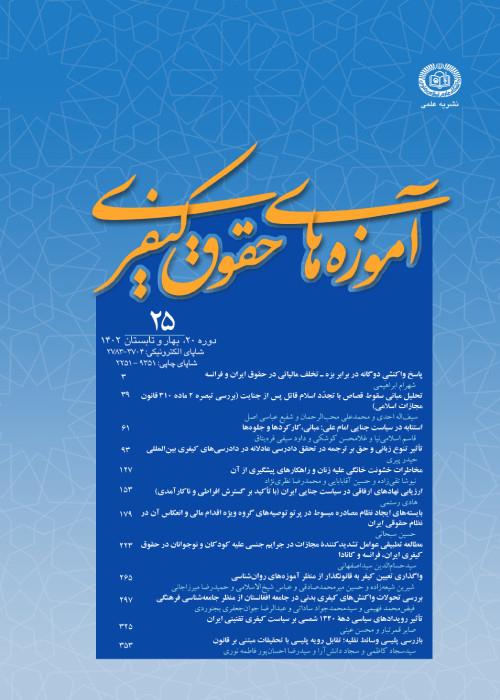A Comparative Study of Jurisprudential and Legal Documents (Evidence) of the Sentencefor the Death Penalty of an AdultererWho Committed Adultery with Maḥrams (incest),the Subject of Article 224 of the Islamic Penal Code
Illegitimate sexual intercourse between a man and a woman is one of the crimes punishable by ḥadd [fixed punishment] in the Islamic legal system, and the Qur'an has determined a certain number of lashes for the perpetrator. Jurisprudents, based on traditions and after that consensus, have described the types of adultery, the perpetrators of some of them, including adultery with incest, have been deemed deserving of death, and the same opinion has been reflected in the penal code. Jurisprudents sentenced the perpetrator of some types of adultery including incest by dividing some types for zināʾ (or zinā زنی or زنا, an Islamic legal term referring to unlawful sexual intercourse) to death (Arabic: قتل, qatl) based on aḥādīth (Arabic: احادیث, singular: ḥadīth, narrations or traditions) and after that consensus, and the same verdict has been reflected in the penal code. Documentary and evidentiary problems of some traditions cited by jurisprudents put the authenticity of this fatwā (Arabic: فتوی, a legal ruling) in doubt. This article, with the aim of evaluating this fatwā in a descriptive-analytical way, has reread and analyzed the evidence referred by the murderers for this verdict, and as it is shown, the limited number of narrations in this regard, in addition to the evidence problems is in strong conflict with the narrations involving punishment(s) for this crime, and the narrations that involving qatl (death penalty), lacks acceptable preponderant point and thus, this fatwā is distorted. In contrast, the aḥādīth (Arabic: احادیث, singular: ḥadīth, narrations or traditions) indicating the general punishment of adultery (flogging) on an adulterer who committed adultery with maḥram (incest), in addition to the validity of the document, are in line with the Qur'an and therefore, they are qualified to be preferred in the position of conflict.
Ḥadd , adultery , Incest , Ḥadd of qatl , Flogging , Sexual offences , Rape
- حق عضویت دریافتی صرف حمایت از نشریات عضو و نگهداری، تکمیل و توسعه مگیران میشود.
- پرداخت حق اشتراک و دانلود مقالات اجازه بازنشر آن در سایر رسانههای چاپی و دیجیتال را به کاربر نمیدهد.


